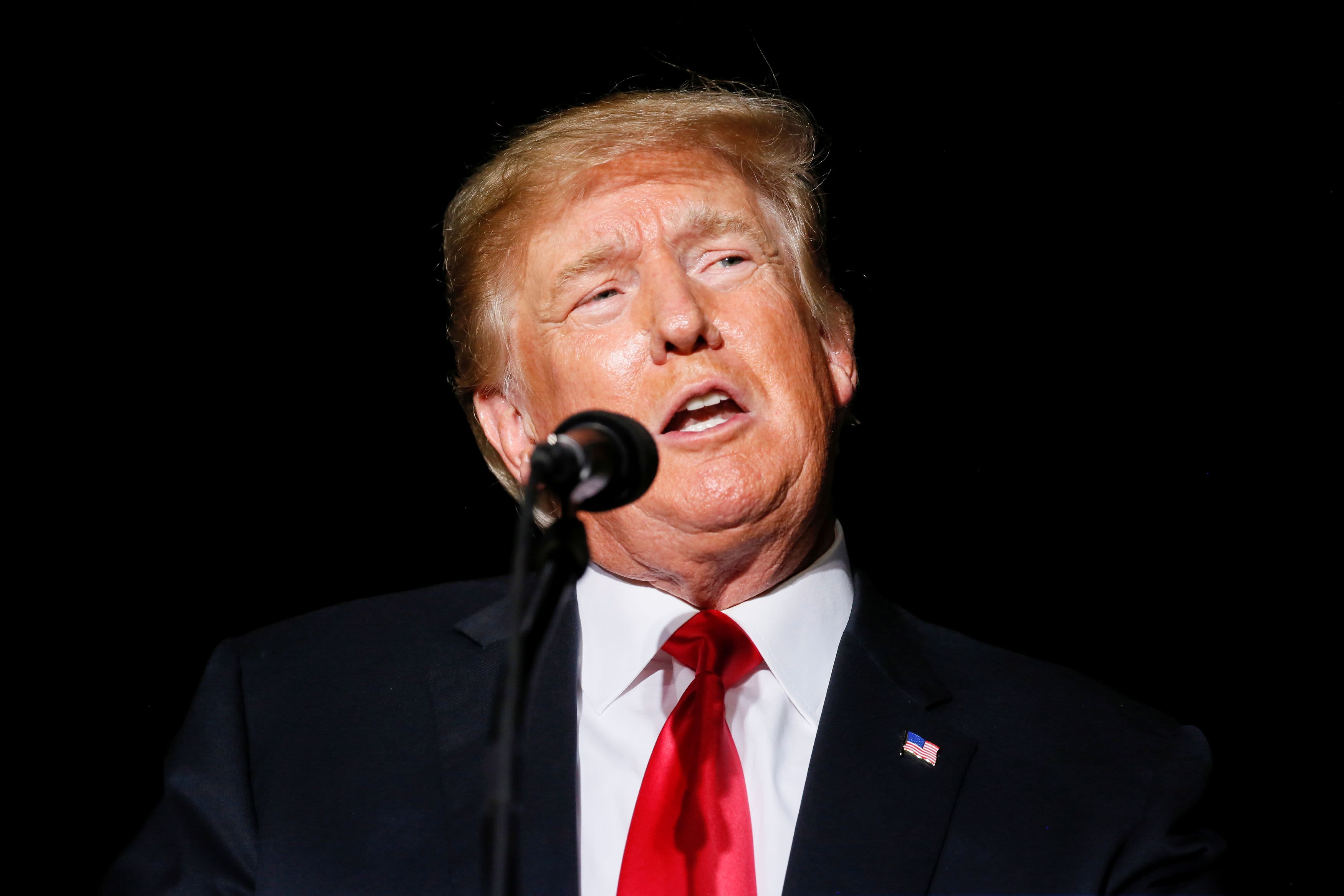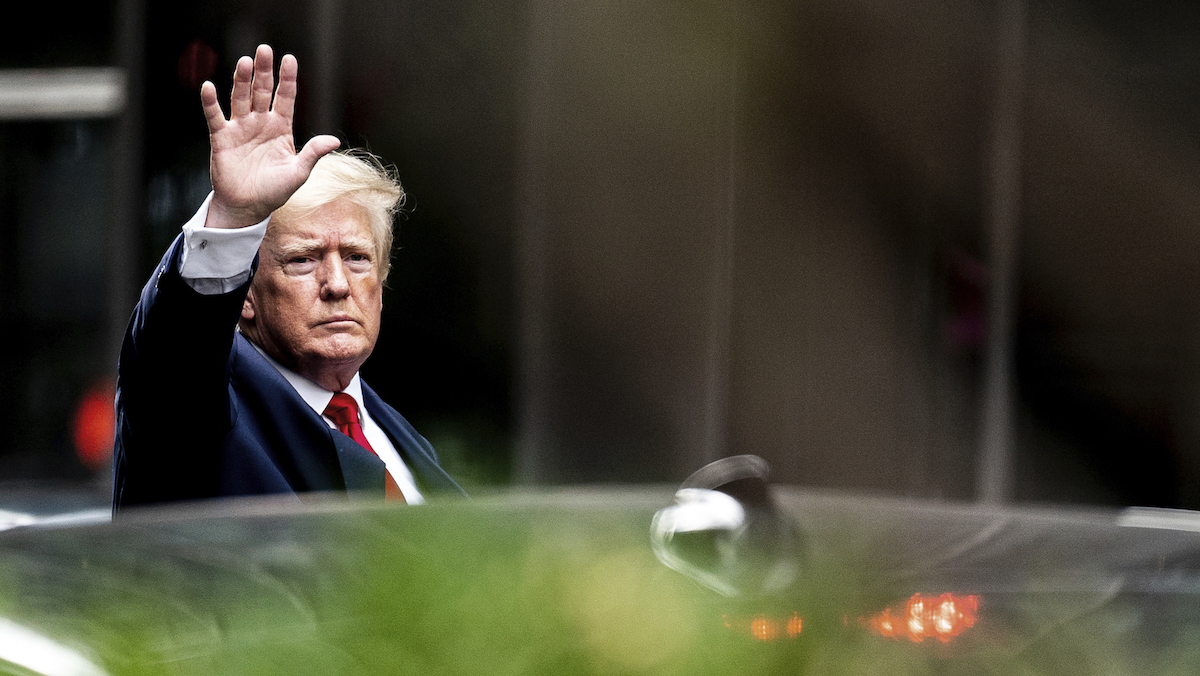Former President Donald Trump showed up Wednesday for questioning under oath in New York's civil investigation into his business practices. But he quickly made clear he wouldn't be answering.
The ex-president issued a statement saying he had done nothing wrong but was invoking the Fifth Amendment's protection against self-incrimination. It's a constitutional right that gets high-profile exposure in settings from Congress to TV crime shows, but there are nuances.
Here's what it means — and doesn't — to “plead (or ‘take’) the Fifth":
WHAT DOES TAKING THE FIFTH AMENDMENT MEAN?
We've got the news you need to know to start your day. Sign up for the First & 4Most morning newsletter — delivered to your inbox daily. Sign up here.
The Fifth Amendment to the U.S. Constitution establishes a number of rights related to legal proceedings, including that no one “shall be compelled in any criminal case to be a witness against himself.”
In the most direct sense, that means criminal defendants don't have to give damning testimony in their own cases. But it has come to apply in non-criminal contexts, too.
“It reflects many of our fundamental values and most noble aspirations,” the Supreme Court wrote in 1964.
Among those ideals: preventing people from being tortured into confessing or being shoehorned into a “cruel trilemma of self-accusation, perjury or contempt” of court.
Many decades earlier, the court also questioned the reliability of confessions made under duress.
IF THE AMENDMENT SPECIFICALLY REFERS TO CRIMINAL CASES, HOW CAN IT APPLY TO A CIVIL INVESTIGATION?
Over time, the Fifth Amendment's protections have been understood to cover witnesses — not just defendants — in criminal and civil courts and other government settings. The Supreme Court has even held that Fifth Amendment rights protected the jobs of public employees who were fired after refusing to testify in investigations unless they got immunity from prosecution.
The Fifth Amendment also underpins the famous Miranda warning about the right to remain silent and have an attorney on hand while being questioned in police custody.
CAN YOU ALWAYS PLEAD THE FIFTH OR ARE THERE LIMITATIONS?
Under what has become the legal standard, the witness has to be facing a genuine risk of criminal prosecution, said Paul Cassell, a criminal law professor at the University of Utah. That means prosecution on any charge in any U.S. court.
There are sometimes disputes over whether the right is being invoked inappropriately. The questioning side can ask a judge to declare that someone needs to answer or face contempt of court and possible penalties.
But “the courts have generally thought that they should give the benefit of the doubt to someone who might be criminally prosecuted, rather than force someone to testify and then learn: ‘Whoops!’" Cassell said.
CAN SOMEONE WHO TAKES THE FIFTH DECIDE TO ANSWER SOME QUESTIONS, BUT NOT OTHERS?
Yes, it’s not necessarily all-or-nothing. But even deciding to answer selectively could be risky: Responding to one question can enable the other side to argue that the witness can’t refuse to answer other, related questions. Another concern: seemingly safe questions could be meant to build evidence about an allegation that’s not on the witness’ radar yet.
Related:
WHAT ARE THE CONSEQUENCES OF PLEADING THE FIFTH?
Legally, it depends. In a criminal case, prosecutors can’t comment on a defendant’s refusal to testify, and a jury can’t be advised that it’s OK to take defendants’ silence as a sign of guilt. The Supreme Court has said that allowing that inference penalizes defendants for simply availing themselves of a constitutional protection.
But in civil cases, jurors generally are allowed to hold silence against a defendant or witness.
Then there’s the court of public opinion.
“Does it look bad? In the general public’s understanding, yes,” says Howard University criminal law professor Lenese Herbert. “But that’s just a result of poor civics education.”
The former federal prosecutor often reminds her students that while jurors might want to hear a defendant’s side of the story, it’s a defense attorney’s job to make sure the jury understands that the client has the right not to take the stand.
IN TRUMP'S CASE, HE'S BEING QUESTIONED IN A CIVIL INVESTIGATION. CAN HE CLAIM THERE'S POTENTIAL FOR CRIMINAL PROSECUTION?
Indeed, his lawyers have already asserted that New York Attorney General Letitia James' civil inquiry is essentially a fact-finding mission for Manhattan District Attorney Alvin Bragg's parallel criminal probe.
James has said her investigation found evidence that the company puffed up the value of real estate assets to snag loans, insurance and tax breaks for land donations. Trump has denied the allegations, and the Republican has slammed the investigation as a political “witch hunt” by Democratic officials.
Meanwhile, other fruits of James' probe led the DA's office to bring criminal tax fraud charges against the businessman-turned-politician's company, called the Trump Organization, and its finance chief. The defendants have pleaded not guilty in that case, which involves claims of off-the-books compensation.
WHAT HAS TRUMP SAID ABOUT INVOKING THE FIFTH?
In the past, Trump has repeatedly suggested that only people with something to hide avail themselves of the protection against self-incrimination. He once declared that “the mob takes the Fifth.”
But on Wednesday, he said he had no choice but to do so.
“I once asked, ‘If you’re innocent, why are you taking the Fifth Amendment?' Now I know the answer to that question,” he said in his statement, calling the probe “a vindictive and self-serving fishing expedition.”
“The United States Constitution exists for this very purpose, and I will utilize it to the fullest extent to defend myself against this malicious attack.”
Trump lawyer Ronald Fischetti had said he'd advise Trump to take the Fifth unless given legal immunity for his answers, though Fischetti complained that publicity surrounding such a choice now could harm Trump’s defense if there’s a criminal charge down the road.
“How can I possibly pick a jury in that case?” Fischetti said in trying, unsuccessfully, to block Wednesday's testimony.
Three of Trump's adult children — Donald Jr., Ivanka and Eric — have already been questioned. Eric Trump invoked the Fifth Amendment more than 500 times during his 2020 deposition, according to a court filing. Donald Jr. and Ivanka reportedly gave their depositions recently, and it's yet unclear whether they took the Fifth.



